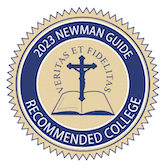In accordance with the spirit and vision of Catholic Distance University as well as the Drug-Free Schools and Communities Act (34 CFR Part 85), the Catholic Distance University administrative buildings are considered a drug-free and alcohol-free University and workplace. Catholic Distance University is a completely online institution, and there is no physical campus. Students and employees are prohibited from the unlawful manufacture, distribution, dispensing, possession or use of a controlled substance or alcohol anywhere on the property belonging to the University including but not limited to grounds, parking areas, or anywhere within the building. Students or employees who violate this policy will be subject to disciplinary action including termination of enrollment and/or employment. For more information visit The U. S. Department of Education’s Higher Education Center for Alcohol and Other Drug Prevention website at www.edc.org.
Catholic Distance University will impose sanctions on students or employees consistent with federal and state law and the guidelines in this policy. Details of federal sanctions can be found at https://www.dea.gov/druginfo/ftp3.shtml. Details of the state of West Virginia sanctions can be found at https://www.legis.state.wv.us/WVCODE/Code.cfm?chap=60a&art=4.
Students and employees must abide by the terms of this policy or Catholic Distance University will take one or more of the following actions within 30 days of violation of this policy by:
- Reporting the violation to law enforcement officials.
- Taking appropriate disciplinary action against the student or employee including termination of enrollment and/or employment.
- Requiring the student to participate in an approved substance abuse rehabilitation program.
Catholic Distance University will make its best effort to maintain a drug and alcohol-free University through implementation of the policy and will establish and maintain a drug-free and alcohol awareness program.
This policy is readily available to students and employees at all times through the catalog located on the website, the student handbook available on the online campus and in the employee handbook. New students/employees will receive a copy of the Catholic Distance University Drug Free Schools and Workplace policy as part of acceptance/orientation process.
Resources:
Because we are a completely online institution, we are unable to provide onsite counseling or treatment. We provide the following information as a resource for those who need assistance with avoiding or recovering from alcohol or drug abuse.
We encourage any student, staff, or faculty member who needs information related to alcohol or drug abuse to use directory information, online searches, the telephone book, or referrals from friends and/or professionals.
The following is a list of national organizations dedicated to providing information and suggestions:
- Substance Abuse and Mental Health Services Administration (SAMHSA)– An agency of the US Department of Health & Human Services providing information online regarding alcohol, drugs, and treatment programs.
General Address: www.samhsa.gov
Specific Address for Treatment Programs: findtreatment.samhsa.gov
1-800-729-6686 - The National Clearinghouse for Alcohol and Drug Information – Part of US Department of Health and Human Services & SAMSHA’s Clearinghouse https://www.samhsa.gov/
1-800-729-6686 - About.com Substance Abuse – Explore the complicated disease of addiction. Information on basic questions concerning drugs and addiction.
- National Institute on Drug Abuse – General Link/Address: www.nida.nih.gov
Specific Link/Address on Club Drugs: www.clubdrugs.org
1-310-443-1124
Drug Violations and Federal Financial Aid
The Higher Education Act states that students convicted for a drug offense that occurred during a period of enrollment while they were receiving federal financial aid may lose eligibility for federal aid. Federal Financial Aid at Catholic Distance University includes Federal Pell, Federal Direct Loans, Federal PLUS Loans, and Graduate PLUS Loans. Students could also be denied other federal benefits, disability, retirement, health, welfare, and Social Security.
Drugs and alcohol are highly addictive and can cause harmful effects to virtually every aspect of a person’s life, e.g., relationships, family, job, school, physical, and emotional health. More details on these harmful effects can be found at the following link https://www.drugabuse.gov/.
There are danger signals that could indicate when someone is in trouble with drugs or alcohol:
- inability to get along with family or friends
- uncharacteristic temper flare-ups
- increased “secret” type behavior
- abrupt changes in mood or attitude
- resistance to discipline at home or school
- getting into a “slump” at work or school
- increased borrowing of money
- a complete set of new friends
We recommend that any person observing any of the above changes utilize the resources listed above and notify the Director of Student Life.




